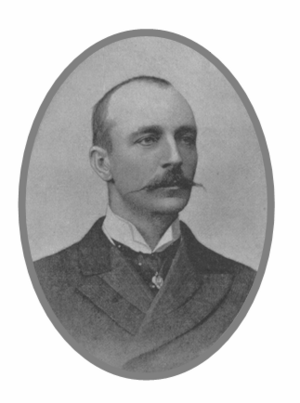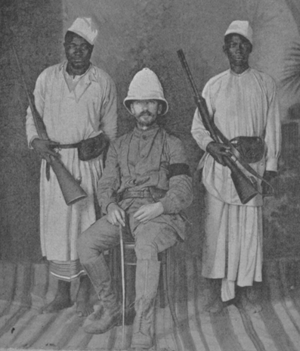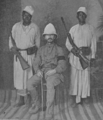Joseph Moloney facts for kids
Quick facts for kids
Joseph Moloney
|
|
|---|---|
 |
|
| Born | 1857 Newry, Ireland |
| Died | 1896 (aged 38–39) Surbiton, London, England |
| Allegiance | |
| Service/ |
|
| Battles/wars | First Boer War |
Joseph Moloney (1857 – 5 October 1896) was an Irish doctor. He served as the medical officer on an important journey called the Stairs Expedition in 1891–92. This expedition went to Katanga in Central Africa. Their goal was to claim the land for King Leopold II of Belgium. During this trip, they met and fought with the local ruler, Msiri.
Moloney took charge of the expedition for a short time. This happened when the main military leaders were either sick or had died. He later wrote a popular book about his experiences. It was called With Captain Stairs to Katanga: Slavery and Subjugation in the Congo 1891–92. The book was published in 1893.
Contents
Early Life and Adventures
Joseph Augustus Moloney was born in Newry, Ireland, in 1857. He studied medicine at Trinity College Dublin and St Thomas's Hospital in London. After his studies, he worked as a doctor in South London. He was also a keen sportsman and loved sailing. People described him as very tough and adventurous.
Moloney had already served as a military doctor in the First Boer War in South Africa. He also worked as a medical officer on a trip to Morocco. He returned from Morocco in 1890. Because of his experience, Captain William Stairs chose him for a new mission. This mission was to travel to Katanga.
The Stairs Expedition to Katanga
The expedition started from Zanzibar. The round trip to Msiri's capital, Bunkeya, took about a year. They stayed in Bunkeya for almost two months. The journey was very difficult. The team faced diseases, periods of hunger, and many other challenges.
About a quarter of the African team members died. Two out of the five European members also passed away, including Captain Stairs. Luckily, Moloney did not get seriously ill. In Bunkeya, Msiri refused to sign a treaty. This treaty would have given Leopold's Congo Free State control over his land.
Msiri was killed during a confrontation with Omer Bodson, the second officer. After Msiri's death, his people and his new chief saw the expedition's strength. They agreed to sign the treaty. This made Katanga part of Leopold's Congo Free State. This region later became known for its harsh treatment of local people.
Moloney's book described Msiri as a cruel ruler. It mentioned that Msiri displayed the heads of his enemies on poles. This was seen as proof of his "barbarity." However, Moloney's book did not mention everything that happened. Another member of the expedition, Christian de Bonchamps, later revealed more details.
Moloney's Views and Character
Moloney was a dedicated medical officer. He was also very loyal to Captain Stairs and his employer. He often wrote good things about the African members of the expedition. He especially praised Hamadi-bin-Malum and some of the porters from Zanzibar.
Moloney also had different ideas from many other colonial officers. He believed that many Arabs in East and Central Africa were decent and kind. He thought they had better relationships with the Bantu people than his colleagues would admit. As a doctor, Moloney treated African villagers whenever he could. He used his medical supplies to help them.
However, Moloney did not question if killing Msiri was right. He also did not think that taking Katanga for Leopold was wrong. He wrote that Msiri was a cruel leader. Moloney believed the expedition had freed the local people from his rule. He also stated that Bodson killed Msiri in self-defense.
Moloney considered what would happen if British interests clashed with their work for the Belgian King. He wrote that he and Stairs would remain loyal to their employer. He did not see Belgium as a major rival to the British Empire. He worried more about France, Germany, or Portugal.
Moloney was described as "very valiant" in his obituary in The Times newspaper. It praised his leadership after Captain Stairs became ill and Bodson died. His actions helped secure control of Katanga. He also helped build a strong fort. This allowed later Belgian expeditions to take firm control.
Life After Katanga
After returning to London, Moloney gave lectures and wrote papers. These papers were about the geography of the expedition's route. He became a Fellow of the Royal Geographical Society. He lived in New Malden, a town in south-west London.
In 1895, Dr. Moloney went back to Central Africa. This time, he joined an expedition with the British South Africa Company. This company had been a rival during the Stairs Expedition. His new mission was to make treaties with African chiefs in North-Eastern Rhodesia. This trip was more peaceful and quite successful.
One chief, Mpeseni of the Ngoni, did not sign a treaty. The Ngoni were a warrior group, similar to the Zulu. Moloney spent two days with Mpeseni but left without an agreement. Two years later, Mpeseni and his warriors fought the British but were defeated.
Dr. Moloney's reputation was not criticized as much as Captain Stairs's. This might be because he later worked for the British South Africa Company. Or perhaps his role was seen as less important. He returned to London but did not live long to enjoy his fame. Joseph Moloney died at age 38. He is buried in Kingston Cemetery in Kingston upon Thames.
Images for kids
 | Emma Amos |
 | Edward Mitchell Bannister |
 | Larry D. Alexander |
 | Ernie Barnes |



